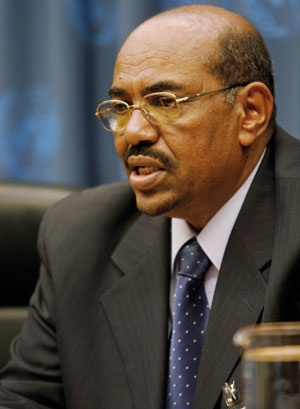 |
| President
Omer Al-Bashir briefs correspondents on the situation in
Darfur region of the Sudan, at United Nations
Headquarters in New York. |
|
|
Most people would agree that the principle upon which the
International Criminal Court (ICC) was set up is a good one. A
court with the jurisdiction to hold rulers, juntas, states and
armies to account for crimes against humanity, war crimes and
genocide wherever they are committed is one that should be
welcomed. In 1998, the ICC was agreed upon in Rome with the
backing of 120 member countries amid hopes that no-one could
escape repercussions from his or her crimes. It’s been more than
eight years since the Court’s been up and running but the
general consensus, today, is that the ICC has failed miserably
to abide by the spirit of its mandate.
Instead of ‘International’ the ICC should, surely, be termed
‘African’. Only four Congolese have ever been surrendered to the
Court. Currently, the ICC is investigating ‘situations’ in the
Democratic Republic of Congo, Uganda and the Central African
Republic.
Subsequent to a UN Security Council Resolution it has recently
issued an international arrest warrant in the name of the
President of Sudan Omar Hassan Al Bashir in connection with
Darfur. Saudi Arabia, Qatar and Egypt have been vehement in
their opposition to the warrant. Both the Arab League and the
African Union are asking the Security Council to defer it for a
year to allow the opportunity for a negotiated peace settlement.
Britain, France and the US are digging in their heels. China and
Russia support the deferral.
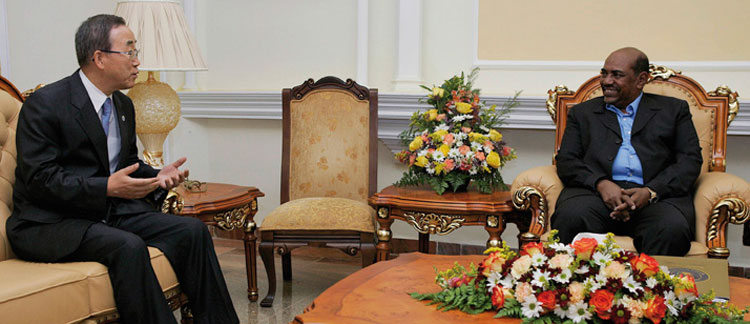 |
|
Secretary-General Ban Ki-moon in a meeting with President
Omar Al-Bashir. Location: Khartoum, Sudan. |
|
| |
|
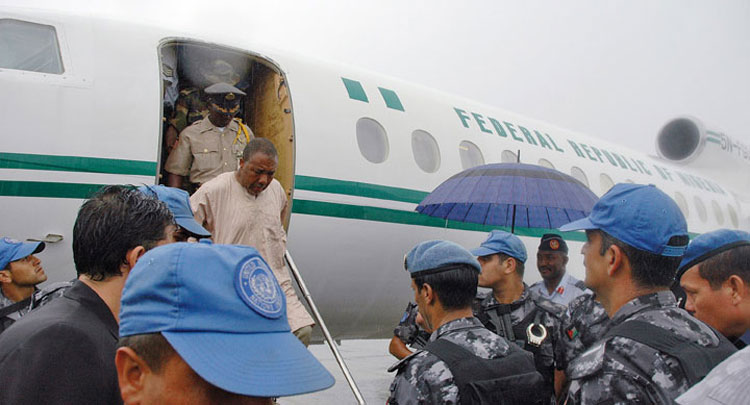 |
| United Nations
Peacekeepers arrest former Liberian President Charles
Taylor. |
|
This is the first time this court has attempted to try a sitting
head of state. The former leader of Yugoslavia Slobodan
Milosevic was tried by a special UN tribunal, while former
Liberian President Charles Taylor is currently awaiting justice
at the hands of a Special Court for Sierra Leone in The Hague.
Those expensive trials have not been particularly successful.
Mr. Milosevic died before his trial reached its conclusion. Mr.
Taylor may shortly walk free because the court which runs on
voluntary contributions is without enough funds to continue.
As for the ICC it has come under mounting criticism. Critics say
it is politicised, selective and biased. After all, are we to
deduce that only Africans have committed war crimes since 2002?
What about those responsible for the invasion and occupation of
Iraq under false pretences, which has resulted in over a million
Iraqi deaths? What about Israel’s slaughter of 1,200 Lebanese
civilians and over 1,400 residents of Gaza with weapons that are
internationally banned for use in highly populated areas, such
as white phosphorous and cluster bombs?
The problem is most of the big powers haven’t ratified
membership of the ICC and, therefore, the only way their
officials could appear before the Court is via a Security
Council referral. This will never happen because they are
largely permanent Security Council members with the power of
veto.
Isn’t there something fundamentally wrong with this scenario?
Imagine a court in any country that is only empowered to deal
with criminals of certain nationalities or relatively powerless
individuals, leaving the big guns to their own devices. That
would be unconscionable if not laughable wouldn’t it? Can a form
of justice that doesn’t apply equally to all be considered just?
Besides the inherent injustice of cherry-picking defendants,
indicting leaders arguably makes the situation worse for the
very people the Court seeks to defend. President Bashir, for
instance, is so outraged that he has expelled a number of
foreign charities and NGOs on whose humanitarian assistance the
people of Darfur depend, accusing them of colluding with the ICC.
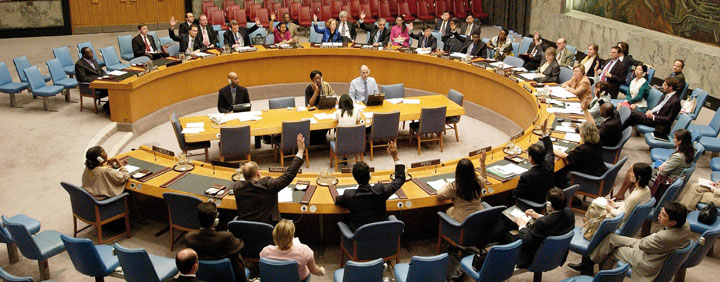 |
| Security Council Approves
Trial Transfer of Former Liberian President, Charles to
Netherlands. |
|
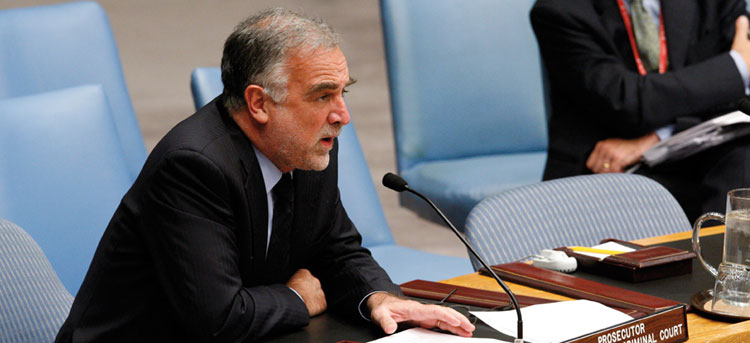 |
| Luis Moreno-Ocampo,
Prosecutor of the ICC, addresses a Security Council meeting
on the situation in the Sudan |
|
While touring the country speaking to massive supportive crowds
he said “We will fight against the neocolonialism. Why does the
ICC turn a blind eye to the criminals that have slaughtered
millions of people? Where is the justice? Where is the
international justice?”
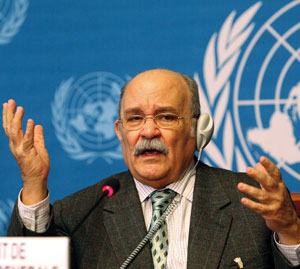 |
| Miguel
d'Escoto Brockmann, President of the sixty-third session
of the General Assembly. |
|
|
Critics who say the warrant against the President of Sudan is
purely political cite the recent discovery of massive reserves
of oil in the west of the country that have been largely
earmarked for China, which, today, buys more than two-thirds of
Sudan’s oil. China’s economic rise has fuelled an
ever-increasing demand for oil and it was quick to form a
relationship with oil-rich Sudan, much to the dismay of its
Western competitors. The two countries have cemented numerous
economic deals and, according to the Washington Post, China is
“Sudan’s largest supplier of arms”.
Had there been a special UN Resolution expressly aimed at
President Bashir’s referral to the Court, it is more than
probable China would have vetoed it. However, Resolution 1953
passed in 2005, requiring Sudan to cooperate fully with the
International Court, has been resurrected for this purpose.
China fears the warrant could destabilize efforts towards peace
in Darfur and has openly come out against it. China’s Foreign
Ministry spokesman Qin Gang praised the bilateral relationship
describing it as “conducive to the two peoples and the region’s
peace and stability. China will continue to develop such a
relationship with Sudan,” he said.
In the unlikely event President Bashir were to be ousted and a
more Western-friendly leader installed in his place, Western
interests would definitely be served. However, there is no way
we can know the true motives of those championing President
Bashir’s arrest. Whether they are inspired by genuine concern
for the long-suffering people of Darfur or something more
sinister is a question only they can answer.
In reality, President Bashir is unlikely ever to appear before
ICC judges. As Richard Dicker of Human Rights Watch pointed out,
the ICC is devoid of police to enforce its warrants and has to
rely on the compliance of governments. The warrant will restrict
his ability to travel, although it’s worth mentioning that out
of the 22 Arab League member countries only Jordan, the Comoros
and Djibouti have ratified the Court.
In January, the Palestinian Justice Minister Ali Khashan wrote
to the ICC recognising its authority as a prelude to its
possible investigation of Israel’s crimes in Gaza. But don’t
hold your breath! Before proceeding, the ICC must first decide
whether Israel has de facto sovereignty over Gaza – in which
event the case would have to be referred to it by the Security
Council – and, most importantly, whether the Palestinian
National Authority can be considered as the leadership of “a
state”.
In Dickens’ famous novel Oliver Twist, Mr. Bumble is informed
that “the law supposes that your wife acts under your direction”
and he retorts, “If the law supposes that…the law is an ass”.
Judging by the International Criminal Court’s record thus far,
those words could be more profound than we realise.
|